| Srl | Item |
| 1 |
ID:
077863
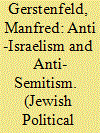

|
|
|
|
|
| Publication |
2007.
|
| Summary/Abstract |
Anti-Semitism's core theme is that Jews embody absolute evil. It has been propagated intensely for many centuries. This extreme fallacy and its principal submotifs have remained largely the same over the ages. Their representation, however, has evolved according to circumstances. The three main permutations of the core theme are religious anti-Semitism-one might call it more precisely anti-Judaism, ethnic (racist) anti-Semitism, and anti-Israelism or anti-Zionism.
These three permutations have a number of common characteristics. There is an ongoing, powerful promotion of a discourse of Jew-hatred. The main motif of the Jew constituting absolute evil manifests itself according to the prevailing worldviews at a given time. Verbal or physical attacks are common against both Jews and Israelis. Jews and nowadays Israel are judged by standards applied to them but not to others. In its extreme form, the anti-Semitic process has three stages: demonization, isolation, and elimination.
The anti-Semitic character of anti-Israelism can be proved through the analysis of cartoons, opinion survey findings, statistical analysis, and semantics. During the summer 2006 war in Lebanon, further proof emerged that anti-Semitism and anti-Israelism go hand in hand
|
|
|
|
|
|
|
|
|
|
|
|
|
|
|
|
| 2 |
ID:
073692
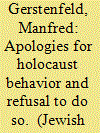

|
|
|
| 3 |
ID:
060868
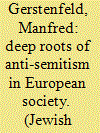

|
|
|
| 4 |
ID:
113990
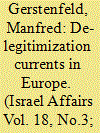

|
|
|
|
|
| Publication |
2012.
|
| Summary/Abstract |
Substantial parts of the European mainstream perceive Israel as a Nazi state due to the extreme way it has been de-legitimized. This is part of much larger and deeper pockets of fragmented and new criminal European ideologies. These attitudes toward Israel and Jews have become an indicator of the continent's moral decadence. If the far-from-hypothetical scenario of a genocidal nuclear attack on Israel comes true, the actual murderers will most probably be Muslims. Yet many influential Europeans will be collaborators and accomplices in nurturing such a scenario through their actions and omissions. Against this backdrop, it is important to realize that it is still possible to fight de-legitimization in an organized and effective way.
|
|
|
|
|
|
|
|
|
|
|
|
|
|
|
|
| 5 |
ID:
096641
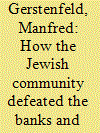

|
|
|
|
|
| Publication |
2010.
|
| Summary/Abstract |
In the mid-1990s there was a sudden renewed public interest in the issue of looted Jewish possessions during the war and their very partial restitution afterward. In the Netherlands, public interest in restitution issues gradually reemerged after several decades of almost total silence. In the late 1990s, public inquiries focused on the government, banks, insurers, and the Amsterdam Stock Exchange. At the turn of the twentieth century, the Amsterdam Stock Exchange was controlled by the major Dutch banks. The restitution negotiations between the Jewish umbrella-body CJO and the exchange therefore became part of those with the Dutch Banking Association (NVB). After exceedingly low financial proposals by the exchange, the representatives of Dutch Jewry in the Netherlands and Israel involved the World Jewish Congress (WJC) in the negotiations. The WJC in turn approached the Hevesi Committee of American comptrollers. Seeing the American business of their members threatened, the NVB agreed to increase the offered payment more than thirtyfold.
|
|
|
|
|
|
|
|
|
|
|
|
|
|
|
|
| 6 |
ID:
078808
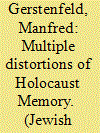

|
|
|
| 7 |
ID:
149183
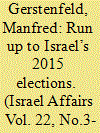

|
|
|
|
|
| Summary/Abstract |
The 19th Knesset dissolved itself on 8 December 2014. New elections were set for 17 March 2015. Polls taken immediately after the dissolution of the Knesset showed major public disaffection with Netanyahu. Yet in polls on hypothetical run-offs against other party leaders, Netanyahu was seen to win in all cases. Labour and Hatnuah ran together. So did four Arab parties. A new party, Kulanu, led by Moshe Kahlon, joined the contenders. Several parties held primaries. In the campaign, online videos played an increasingly important role. Polls during the final days and exit polls turned out to be unreliable. The Likud became the largest party in the 20th Knesset with 30 seats.
|
|
|
|
|
|
|
|
|
|
|
|
|
|
|
|
| 8 |
ID:
137544
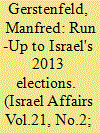

|
|
|
|
|
| Summary/Abstract |
On 15 October 2012, the 18th Knesset – which had been elected in February 2009 – voted unanimously to dissolve. The date for the elections for the 19th Knesset was then set for 22 January 2013. This article follows the events leading to the election day. It shows that there were four distinct phases during that period. It describes the internal organization and primary elections in Israel's major parties, Likud and Avoda; the debate about the formation of political alliances which led to the joint list of Likud–Israel Beiteinu; the stabilization of the political blocs; and the emergence of new political forces (such as Yesh Atid). The article also discusses the impact of major events, such as the military operation Pillar of Defence, on the elections and the electoral campaign. The article discusses the parties’ campaigns and the proliferation of opinion polls. It also shows that much of the campaigning of the parties was directed against other parties of the same bloc, be it the centre-right or the centre-left.
|
|
|
|
|
|
|
|
|
|
|
|
|
|
|
|
| 9 |
ID:
078591


|
|
|
| 10 |
ID:
093896
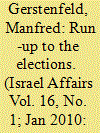

|
|
|
|
|
| Publication |
2010.
|
| Summary/Abstract |
On 26 October 2008 President Shimon Peres called for new elections. The Knesset was dissolved on 11 November. Three candidates claimed that they were in the running for prime minister: Livni, Netanyahu and Barak. The election campaign would focus more on individuals than on parties. The security issue took high priority in the elections. A major issue throughout the campaign was the position of the leading parties on the establishment of two states for two peoples as part of a peace agreement. The internet became a major tool in the campaign. On the morning of 27 December, the IDF began a war in the Gaza Strip, which Israel called Operation Cast Lead. The major parties agreed to suspend their campaigns until the end of the war. Kadima's victory with 28 seats came as a surprise. The Likud came second with 27 seats, having lost voters at the end of the campaign to the third largest party Yisrael Beiteinu, which ended up with 15 Knesset seats. Looking back at the election campaign one can best define it as a broken and shortened one.
|
|
|
|
|
|
|
|
|
|
|
|
|
|
|
|
| 11 |
ID:
084578
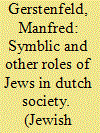

|
|
|
| 12 |
ID:
058834
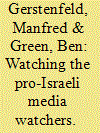

|
|
|